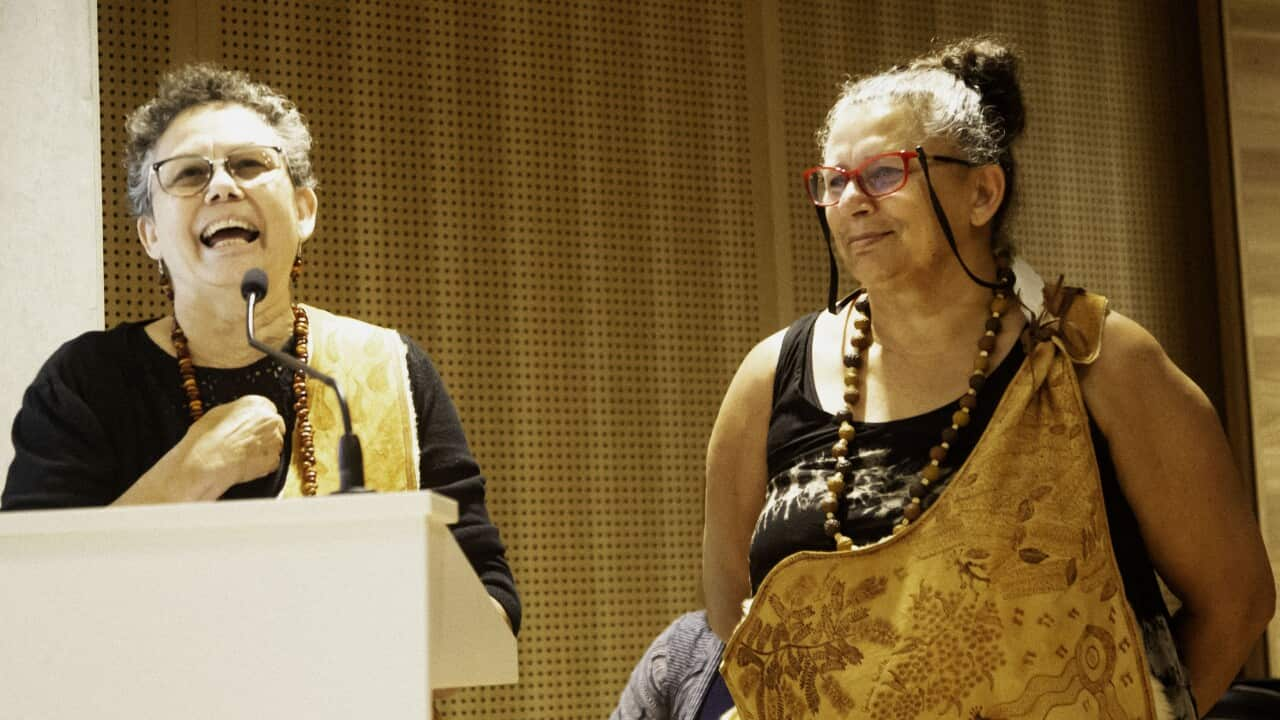When Aunty Diane Riley-McNaboe was a child, learning her Wiradjuri language carried a devastating threat.
"I grew up doing what they call 'words in isolation'," Aunty Diane says.
"I listened to some of our Elders speaking, but not whole sentences. They do what we call 'talking whispers', behind buildings or trees or out bush away from the kids so that we wouldn't be picking up the language and be taken away."
Her journey of overcoming that racist barrier and becoming fluent in language required tenacity and hours of workshops, weekly meet-ups with other language students and minimal resources.
With the help of language advocates Stan Grant Snr and John Rudder, compilers of a Wiradjuri dictionary, she eventually became one of the first teachers at Dubbo TAFE teaching Wiradjuri language.
Spreading the word

Dr Lynette Riley and Aunty Diane Riley-McNaboe share their language with grandchildren at the launch of their Wiradjuri Workbook series at Sydney University on January 23, 2023
They've launched a series of seven books, titled 'Wiradjuri Workbooks', which will help do just that.
"The books cover things like the seasons, numbers, colours, sounds and animals," Aunty Diane explains.
"When you walk into a newsagency and grab an activity book to do while you are going on a plane or a train, these books are along those same lines, with crosswords and find-a-words."
Produced in collaboration with Sydney University, the series is a rich cultural and language resource that represents an evolution in knowledge sharing, and whilst any age group will benefit from the resources, there is one particular demographic they are hoping to reach.

The Wiradjuri Workbook series feature language and some symbols that can also be found across different language groups around the country.
Connecting with culture
Aunty Lynette had been listening to conversations around what Department Of Children's Services and similar organisations were doing with First Nations children that have been taken off their traditional lands.
Both sisters wondered how children off Country could still learn about their culture and language when they were away from family.
"That's what made us decide to do these books, for children that have been taken away and for the Stolen Generation... those adults that have been taken away when they were children and weren't allowed to learn their language and culture.
"I believe it's one of the biggest things for reconciliation and for healing."
Aunty Diane said the workbooks offer a complement to anyone expanding their cultural knowledge, beyond the lands of the Wiradjuri.
"With the symbol art, even though lot of it is Wiradjuri symbols, there's Aboriginal symbols that are used right across Australia. So these books can be used by a lot of people that are trying to understand how we do our cloaks and do our storytelling using these symbols."
The passing on of this knowledge is seen by the sisters as not only a cultural resource, but leaving a legacy of healing. Connection to Country has many elements, and knowing the language of a place is just the beginning.
"If you're on Country, you should know about the country you're living on. What are those rivers named? What are their totems? What's those different mountains?" she says.
"A 'dubbo' is a ceremonial mourning cap worn by the women when their partners died. To mark the law that no man was to come near that woman while she was going through mourning. Narromine or Ngarru Mayin is 'honey people'.
"So if you're going to go across Country and you're using Aboriginal language, shouldn't you know what they mean? I think it's important."
The Wiradjuri Workbooks can be accessed via











